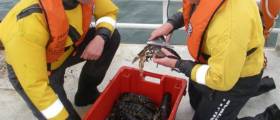Displaying items by tag: Irish Fish Producers' Organisation
Ireland would have breached EU law had it not implemented a new points system last weekend for serious infringements by fishing vessel licence holders, says the government in response to criticism from the Irish Fish Producers' Organisation.
The relationship between the Department of Agriculture Food and the Marine and the Irish Fishing Industry has now reached an all time low, according to the Irish Fish Producers' Organisation. This follows the Minister signing into law a new penalty points system 'without consultation with the industry' and after the High Court had dismissed the previous system.
'Nothing can be considered lower than penalising someone who has been found innocent by a court of having committed an offence. There is neither a legal nor moral basis for this. It is totally unacceptable and it’s important that the public are made aware of this," said the Chief Ececutive of the IFPO, Francis O'Donnell. Fishermen are expected to go back to the High Court over the situation.
In response the Department of Agriculture, Food and the Marine told Afloat.ie:
The EU Fisheries Control Regulation requires Member States to have in place legal provisions to implement a Points system for serious infringements of the EU Common Fisheries Policy. This EU Points system is applicable to all fishing vessels which fish in the Irish exclusive fisheries zone, whether they be Irish or Foreign flagged.
Ireland had previously implemented the required EU Points system for serious infringements by fishing vessel licence holders by means of a Statutory Instrument which gave effect to the EU requirement in Irish law . This Statutory instrument was the subject to two recent High Court challenges and was struck down. The two High Court Judgements are subject to appeal.
As Ireland is required to have in place a legal instrument implementing the EU Points system a new amended legal instrument was drafted and put in place which took on board, to the extent possible, issues of concern in relation to procedures and process which had been highlighted in the High Court Cases.
The replacement legal instrument , with amended procedures and processes, (S.I. No. 125 of 2016 - European Union (Common Fisheries Policy) (Point System) Regulations 2016) was signed by the Minister on 1 March 2016 so as to avoid a legal lacunae , which would have meant the EU Points system would not have been applicable to Irish or Foreign flagged vessels for serious infringements of the EU Common Fisheries Policy in the Irish 200 mile zone. This new legal instrument adopts the requirements of Article 92 of Council Regulation(EC) No. 1224/2009 of 20 November 2009 and Title VIl of Commission Implementing Regulation (EU) No. 404/2011 of 8 April 2011. In accordance with the regulations this instrument establishes the required EU point system, with amended procedures and processes, which will apply to the Licence Holder of a sea-fishing boat when a serious infringement of the Common Fisheries Policy is detected within the Exclusive Fishery Limits of the State or for an Irish vessel, wherever it may be.
It is important to note that the assignment of points is an administrative act and separate from a prosecution for a fishery offence for breaches of the common fisheries policy. Therefore to await the outcome of the results of a prosecution for fishery offence does not comply with European Union law.
Points are assigned to the licence holder. In the majority of cases the Licence Holder is a different person or legal entity to the person on the vessel who commits an offence and who will be prosecuted. Therefore there is no connection between the assignment of points and the prosecution by the Courts of offences under fishery law.
The EU regulations require that points be assigned from the date of the detection of the 'serious infringement'. That requires that the procedures are sufficiently swift to be determined in as short a time as possible. Fishery prosecutions may take some considerable time before they are finally determined.
To await the outcome of a prosecution therefore would put Ireland in breach of EU law as this would result in considerable delay particularly as the assignment of points is separate to and not dependant on a conviction in the Courts and, as the licence holder (the person assigned the points) is generally not the person prosecuted.
In bringing in this Statutory Instrument it was necessary to strike a balance between Ireland's obligations under EU law with a system that gives licence holders a fair hearing, along with ample opportunity to deal with any issue a licence holder may have. This was done by setting up determination panels and a right to apply to an independent adjudicator thereafter if the licence holder is dissatisfied with a determination of the panel. This is an independent and robust system intended to achieve the objective of the common fisheries policy which is the conservation of fish stocks to secure the future of the fishing industry. The purpose of conservation of fish stocks is twofold. Firstly, as an end in itself to preserve the fishing resources for all and for future generations. Secondly, to reassure the majority of law abiding Irish fishermen fishing within the rules that the State is taking seriously their concerns that a fishing industry can be maintained for them and those coming after them. The conservation of this precious and valuable resource is in everyone's interest and is vital for the future of the Irish fishing industry .
The Sea Fisheries Protection Authority is determined as the competent authority for the administration of the points system including the establishment of the determination panel and the assignment of points.
























































